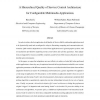Free Online Productivity Tools
i2Speak
i2Symbol
i2OCR
iTex2Img
iWeb2Print
iWeb2Shot
i2Type
iPdf2Split
iPdf2Merge
i2Bopomofo
i2Arabic
i2Style
i2Image
i2PDF
iLatex2Rtf
Sci2ools
JHSN
2000
2000
A hierarchical Quality of Service control architecture for configurable multimedia applications
In order to achieve the best application-level Quality-of-Service (QoS), multimedia applications need to be dynamically tuned and reconfigured to adapt to fluctuating computing and communication environments. QoS-sensitive adaptations are critical when applications run in general-purpose systems, with no mechanisms provided for supporting resource reservations and real-time guarantees. Such adaptations are triggered by resource availability variations caused by best-effort resource allocations in unpredictable open environments. In this paper, we argue that adaptations are most effective to achieve a better QoS when performed within applications, where they may be optimized towards the best performance tradeoffs across various application parameters with different semantics. However, we believe that decisions about when and how adaptations should occur need to be coordinated, and formalized as a generic algorithm to be applied to a wide range of applications. For this purpose, we firs...
Related Content
| Added | 19 Dec 2010 |
| Updated | 19 Dec 2010 |
| Type | Journal |
| Year | 2000 |
| Where | JHSN |
| Authors | Baochun Li, William Kalter, Klara Nahrstedt |
Comments (0)

